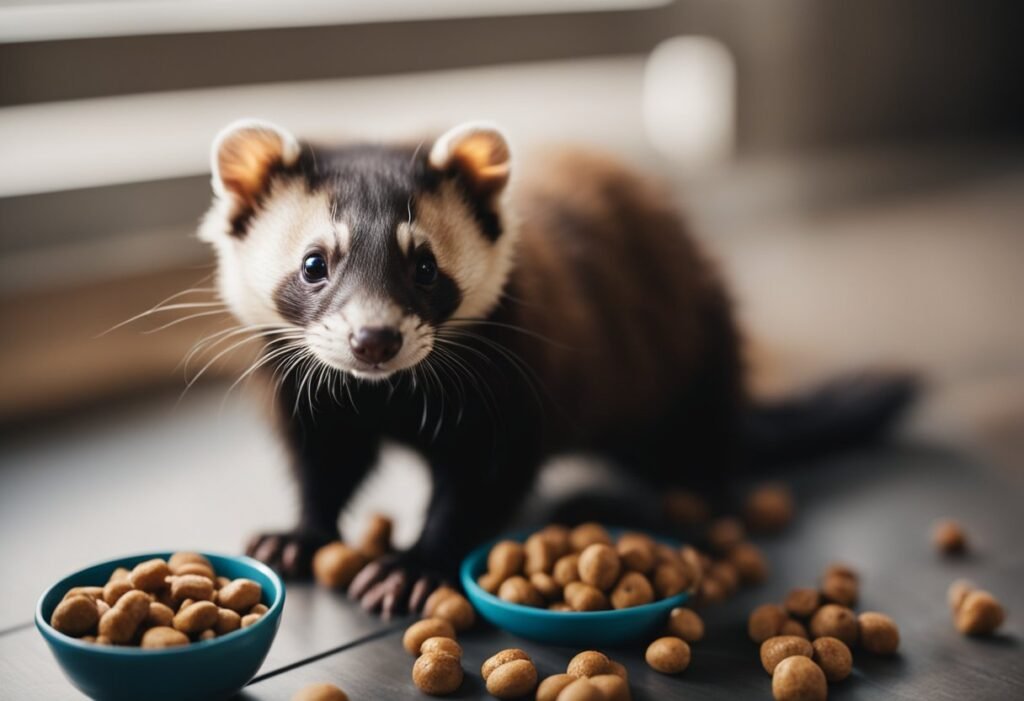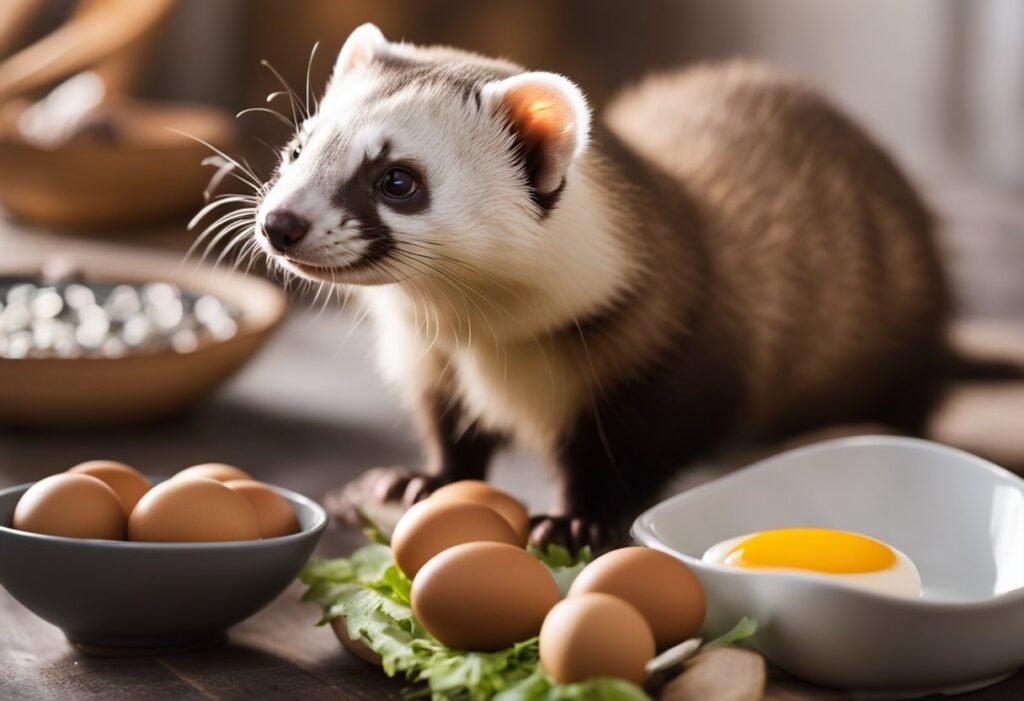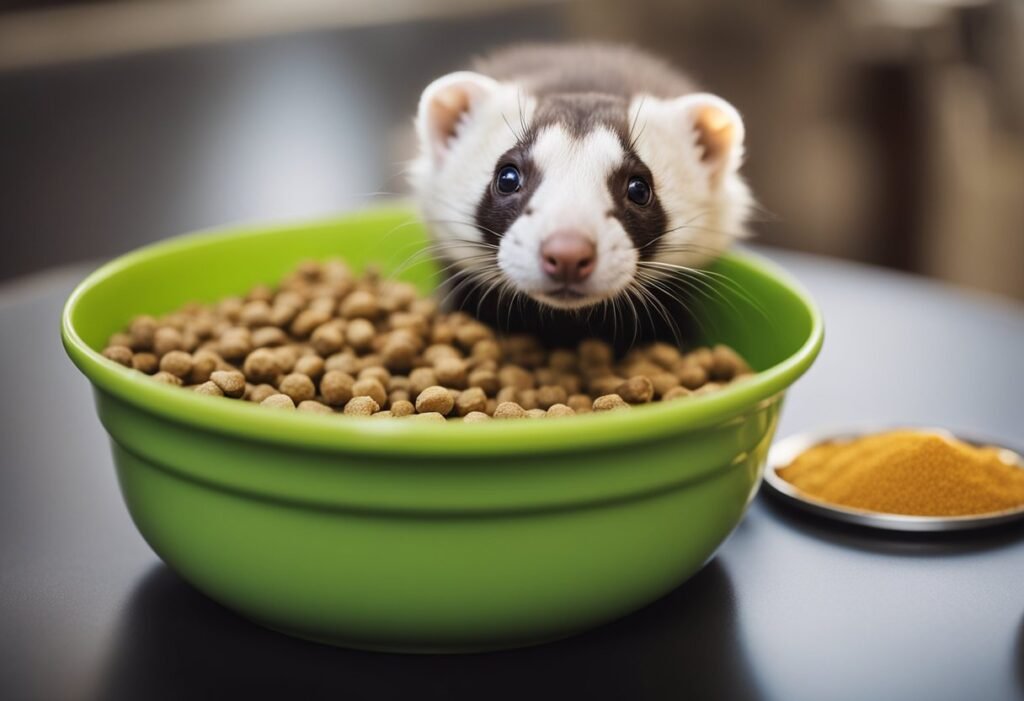Ferrets are known for their playful and curious nature, making them popular pets among animal lovers. As with any pet, it’s important to provide them with a balanced and nutritious diet to maintain their health. While there are many commercial ferret foods available, some pet owners may wonder if it’s safe to feed their ferret dog food.
Dog food is formulated specifically for dogs and may not provide the necessary nutrients that ferrets need to thrive. Ferrets have a high protein requirement and need a diet that is rich in animal-based protein. While some dog foods may contain meat, they may also contain grains and fillers that are not ideal for a ferret’s diet. Additionally, some dog foods may contain ingredients that are harmful to ferrets, such as onions or garlic.
Can a Ferret Eat Dog Food

Ferrets are obligate carnivores, which means that they require a diet that is high in protein and fat. While dogs are also carnivores, their nutritional requirements differ from those of ferrets. Therefore, it is not recommended to feed dog food to ferrets as their primary diet.
Most dog foods are formulated to meet the nutritional needs of dogs, which may not be ideal for ferrets. Ferrets need a diet that is high in animal protein, fat, and low in carbohydrates. Dog foods may contain fillers and grains that are not suitable for ferrets and can cause digestive issues.
Additionally, dog foods may not contain the necessary nutrients that ferrets require, such as taurine, which is essential for their heart health. Feeding dog food to ferrets can lead to nutritional deficiencies and health problems in the long run.
In conclusion, while ferrets may eat dog food in small quantities as a treat, it is not recommended to feed it as their primary diet. Ferrets require a specific diet that meets their nutritional needs, and feeding them dog food can lead to health problems. It is best to consult with a veterinarian or a ferret nutritionist to determine the best diet for your ferret.
Basic Dietary Needs of Ferrets

Nutritional Requirements
Ferrets, like all animals, require a balanced diet to maintain their health. The ideal diet for a ferret should consist of high-quality protein, moderate fat, and low carbohydrates. They have a high metabolism and require a diet rich in animal protein to meet their nutritional needs.
Ferrets require a diet that is high in fat and protein, and low in carbohydrates. They have a short digestive tract, which means that they need to eat frequently to maintain their energy levels. Ferrets are obligate carnivores, which means that they require a diet that is based on animal protein.
Differences Between Ferret and Dog Diets
While ferrets and dogs are both carnivores, their dietary needs are quite different. Ferrets require a higher protein and fat content in their diet than dogs do. They also require a diet that is low in carbohydrates.
Dog food is not an ideal diet for ferrets because it is not formulated to meet their nutritional needs. Dog food is typically lower in protein and fat than ferret food, and it may contain ingredients that are not suitable for ferrets.
In conclusion, it is not recommended to feed a ferret dog food as their primary diet. It is important to provide them with a balanced diet that meets their nutritional needs to ensure their health and well-being.
Potential Risks of Feeding Dog Food to Ferrets

Nutritional Deficiencies
Ferrets have specific dietary needs that differ from dogs, and feeding them dog food can lead to nutritional deficiencies. Dog food lacks the high protein and fat content that ferrets require. Ferrets need a diet that is high in animal protein and fat, and low in carbohydrates. Feeding them dog food can lead to malnutrition, which can cause health problems in the long run.
Health Complications
Feeding dog food to ferrets can also lead to various health complications. Dog food contains ingredients that are not suitable for ferrets and can cause digestive problems. For instance, dog food contains grains and plant-based proteins, which are not easily digestible by ferrets. This can lead to gastrointestinal issues, such as diarrhea, vomiting, and bloating.
Moreover, dog food contains a lower amount of taurine, an essential amino acid that ferrets need to maintain a healthy heart. Feeding dog food to ferrets can lead to taurine deficiency, which can cause heart problems, such as dilated cardiomyopathy.
In conclusion, feeding dog food to ferrets is not recommended as it can lead to nutritional deficiencies and health complications. It is essential to feed ferrets a balanced diet that meets their specific nutritional needs.
Appropriate Diet for Ferrets
Ferrets are obligate carnivores, which means they require a diet high in animal protein to stay healthy. A balanced diet is essential for ferrets to prevent nutritional deficiencies and health issues.
Recommended Ferret Foods
Ferrets should be fed a high-quality ferret food that is specifically formulated for their nutritional needs. These foods are usually made with a combination of animal-based proteins and fats, and they have a higher protein content than many other pet foods. Some of the top brands of ferret food include Marshall, Wysong, and Orijen.
When selecting a ferret food, it’s important to check the ingredients list to ensure that it contains high-quality protein sources like chicken, turkey, or lamb. Avoid foods that contain fillers like corn, wheat, or soy, as these ingredients are not easily digestible for ferrets and can cause digestive upset.
Treats and Supplements
Ferrets can also enjoy occasional treats and supplements, but these should be given in moderation. Treats should make up no more than 10% of a ferret’s diet, and they should be low in sugar and fat. Some good options for ferret treats include freeze-dried meat, raw eggs, and small amounts of fruits and vegetables.
Supplements can be beneficial for ferrets, especially those that are not getting all of their nutrients from their food. Ferrets can benefit from supplements like salmon oil, which is rich in omega-3 fatty acids, and probiotics, which can help support digestive health. However, it’s important to consult with a veterinarian before adding any supplements to a ferret’s diet.
Overall, a balanced diet is essential for the health and well-being of ferrets. By feeding high-quality ferret food and providing occasional treats and supplements, pet owners can help ensure that their ferrets stay healthy and happy.
Alternatives to Dog Food for Ferrets
When it comes to feeding ferrets, it is important to provide them with a balanced and nutritious diet. While dog food may seem like a convenient option, it may not be the best choice for ferrets. Fortunately, there are several alternatives to dog food that can provide your ferret with the nutrients they need.
Homemade Ferret Meals
One option is to prepare homemade meals for your ferret. This allows you to control the ingredients and ensure that your ferret is getting a balanced diet. A homemade meal for ferrets should consist of high-quality protein sources, such as chicken, turkey, or beef, as well as some fruits and vegetables.
Here is an example of a homemade ferret meal:
- 1/4 cup cooked chicken or turkey
- 1 tablespoon of finely chopped fruits and vegetables (such as carrots, apples, or sweet potatoes)
- 1/8 teaspoon of ferret-specific vitamin and mineral supplement
Mix all the ingredients together and serve immediately. It is important to note that ferrets have a high metabolism and require frequent meals throughout the day.
Commercial Ferret Diets
Another alternative to dog food is commercial ferret diets. These diets are specifically formulated to meet the nutritional needs of ferrets. They come in a variety of forms, including kibble, canned food, and freeze-dried options.
When choosing a commercial ferret diet, look for one that contains high-quality protein sources, such as chicken or turkey, and is free from fillers and artificial ingredients. It is also important to ensure that the diet contains the appropriate levels of fat and fiber for your ferret’s age and activity level.
Some popular brands of commercial ferret diets include Marshall Premium Ferret Diet, Wysong Ferret Epigen 90, and Orijen Cat and Kitten.
In conclusion, while dog food may seem like a convenient option for feeding ferrets, there are several alternatives that can provide your ferret with a balanced and nutritious diet. Homemade ferret meals and commercial ferret diets are both great options to consider.
Feeding Practices for Ferrets
Feeding Schedule
Ferrets are obligate carnivores, which means that they require a diet that is high in animal protein. It is recommended to feed ferrets 2-3 small meals per day, with a total of 4-6 ounces of food. It is important to note that ferrets have a fast metabolism, so they require frequent feeding to maintain their energy levels.
Portion Control
Portion control is important when feeding ferrets. Overfeeding can lead to obesity, which can cause health problems such as insulinoma and heart disease. It is recommended to measure out the appropriate amount of food for each meal using a kitchen scale or measuring cup.
When choosing a food for your ferret, it is important to select a high-quality, protein-rich food that is specifically formulated for ferrets. While dog food may contain some of the nutrients that ferrets need, it is not a suitable substitute for a ferret’s diet.
In summary, feeding practices for ferrets should include a feeding schedule of 2-3 small meals per day, with a total of 4-6 ounces of food, and portion control to prevent overfeeding. It is important to choose a high-quality, protein-rich food that is specifically formulated for ferrets.
Frequently Asked Questions
What should a balanced diet for a pet ferret include?
A balanced diet for a pet ferret should consist of high-quality, protein-rich foods. Ferrets are obligate carnivores, which means that their diet should mainly consist of meat-based products. A good ferret diet should include high-quality ferret food, raw or cooked meat, and occasional treats such as fruits and vegetables.
Is it safe for ferrets to consume cat food as an alternative to their regular diet?
While cat food may seem like a viable alternative to ferret food, it is not recommended to feed your ferret cat food as a regular diet. Cat food doesn’t contain the right balance of nutrients that a ferret requires, and some ingredients in cat food may be harmful to ferrets.
What are the potential risks of feeding ferrets raw dog food?
Feeding raw dog food to your ferret can be risky because it may contain harmful bacteria such as Salmonella and E. coli, which can cause illness in ferrets. Additionally, dog food doesn’t contain the right balance of nutrients that a ferret requires.
Can ferrets have scrambled eggs as part of their diet?
Yes, ferrets can have scrambled eggs as part of their diet. Eggs are a good source of protein and can be a healthy treat for your ferret. However, eggs should not be a primary source of food for your ferret, and they should be cooked thoroughly before feeding.
What emergency substitutes can I offer my ferret if I run out of specialized ferret food?
If you run out of specialized ferret food, you can offer your ferret a high-quality kitten food as a substitute. Kitten food is similar in nutrient content to ferret food and can be a temporary solution until you can purchase more ferret food.
How does a ferret’s dietary needs differ from that of a dog?
Ferrets have different dietary needs than dogs. Ferrets require a higher protein and fat content in their diet, and their diet should consist mainly of meat-based products. Dogs, on the other hand, can have a more balanced diet that includes both meat and plant-based products. It is important to feed your ferret a diet that is specifically formulated for their unique nutritional needs.





